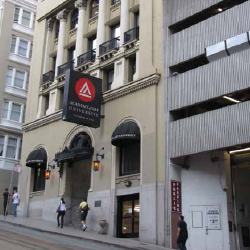
The Art of Security
Academy unveils access control migration program
- By Brett St. Pierre
- Dec 01, 2013
 Academy of Art University in San Francisco was established in 1929
by Richard S. Stephens, a fine art painter and creative director for
Sunset Magazine. Opened in a single, rented loft initially to teach
advertising art, the university soon assembled a distinguished faculty
of practicing art and design professionals with a shared philosophy:
hire established professionals to teach future professionals.
Academy of Art University in San Francisco was established in 1929
by Richard S. Stephens, a fine art painter and creative director for
Sunset Magazine. Opened in a single, rented loft initially to teach
advertising art, the university soon assembled a distinguished faculty
of practicing art and design professionals with a shared philosophy:
hire established professionals to teach future professionals.
Today, the university has more than 18,000 students and 30 areas of academic
emphasis, making it the country’s largest private school of art and design. At the
same time, the university boasts a thriving campus life—including clubs, special
events and social activities—and its Urban Knights athletic program, which competes
at the NCAA Division II level.
Operating a large university campus in a busy, urban setting can be challenging
enough, but when the campus spans dozens of geographically-dispersed buildings
that house expensive equipment and high-value student work, the challenge
becomes even more complex.
Academy of Art University in San Francisco met these challenges with an access
control system that simultaneously delivers the security it needs, along with
important, new capabilities and an improved campus experience.
Security Changes and Access Control
In the early 2000s, Academy of Art University occupied approximately 20 buildings
that housed classrooms, offices and residential halls scattered across the city.
Each location had multiple points of access, and was protected only by basic locks
and metal keys. The inadequate security of this arrangement became painfully
apparent after a daylight break-in and burglary at one of the university residence
halls, resulting in significant property losses.
According to Mike Petricca, the university’s campus safety director, this was
unacceptable for a university that prides itself on giving students a safe place to
learn, where they can nurture their creativity and put countless hours into valuable
work portfolios.
To improve security, the university took what previously was a one-man campus
safety organization augmented with security guards, and replaced it with an
organization spanning 130 employees, a 24-hour patrol team, a campus communications
center with emergency dispatching service and around-the-clock safety
hosts stationed at most buildings. Additionally, the university embarked on a program
to secure every building across its widely-dispersed campus.
“What has resulted is the nation’s first university to be completely locked down
with all access controlled through a single, centralized system,” Petricca said. “Securing
all of our doors with an access control system was the single, most important
thing we had to do to improve our campus security.”
The university also needed its access control system to be easy to expand without
forfeiting earlier investments. Meeting both security and scalability needs required
moving to a system based on an open architecture that could support multiple card
technologies and future enhancements. With this platform, the university’s cardholders
would be able to do more than just open doors with their ID cards.
Picking a Solution
For its solution, Academy of Art University turned to Microbiz Security Co., a
long-time HID Global partner and provider of consolidated security solutions
including video surveillance, intrusion and access control products. Microbiz
recommended HID Global’s iCLASS SE platform, including the company’s multiCLASS
SE readers that support both Indala low-frequency, entry-level proximity
cards for physical access control, and iCLASS SE high-security smart card
credentials.
The iCLASS SE platform can be used with iCLASS, MIFARE and DESFire
card technology, as well as iCLASS Seos, high-security smart card credentials.
Both iCLASS SE and iCLASS Seos card technology use HID Global’s Secure
Identity Object (SIO) data model, which represents many forms of identity information
on any device that has been enabled to work within the secure boundary
and the central identity management ecosystem of the company’s Trusted Identity
Platform (TIP).
TIP and SIOs enable iCLASS Seos credentials to be carried inside Near Field
Communications (NFC)-enabled smartphones in a managed access environment.
The academy sees this as an important future capability that will be attractive to
students, faculty and staff who rely more and more on smartphones for a variety
of daily tasks.
In the first two months since initiating deployment, the university installed approximately
40 multiCLASS readers in 14 buildings. It has since installed nearly
260 readers in approximately 50 buildings, including 17 resident halls. Every resident
hall and computer lab is now protected, and the university continues to install
new readers as it acquires buildings and adds or reconfigures rooms to house valuable equipment and assets.
Additionally, the university has
completely replaced the previous magnetic
stripe (magstripe) cards that were
issued but never carried or used. The
university is now issuing approximately
65,000 to 75,000 ID cards each semester
using HID Global’s “Corporate 1000
Program,” which provides a unique,
35-bit card format that supports more
than one million individual card numbers
for use with standard HID proximity
readers.
Approximately 25,000 cards are in
use at any given time, and card numbers
are tracked during the manufacturing
process to ensure they are not duplicated.
The university’s access control
system automatically turns the cards
off at the conclusion of one semester
and back on again at the beginning of
the next, or permanently disables the
student’s identity following their resignation
or failure to re-enroll.
With its new access control solution,
metal keys are no longer required and
the ID cards enable users to open doors
much more quickly, which can be very
important in an urban environment.
The same card that is used to open
doors can also be used to enter Urban
Knights sporting events or make
purchases using Knight Kash, the university’s
debit program, for meals and
cashless vending.
Academy of Art University created
its Knight Kash program to be the ultimate
complement to the university
experience. ID cards are used not just
for dining on campus, but also at offcampus
merchant partner establishments
to provide the greatest possible
flexibility, variety and value. The university
also uses the cards for a partand
full-time employee payroll system,
and is considering using the cards for
student attendance systems and other
applications in the future, as well as
enabling users to carry the ID cards on
their smartphones.
Multiple Benefits Achieved
The university has realized a number of
important benefits from its new access
control system—including documented
reductions in theft, even as enrollment
has increased—and an improved campus
experience. The system has significantly
improved reporting capabilities,
enabling the security team to provide
valuable input about building use,
which resulted in new building access
hours and policies.
“We’ve certainly seen a lot of change
at our campus in terms of technologies,
policies and procedures, and it was all
necessary in order for us to achieve
the security we needed along with an
enhanced experience for everyone that
spends time here,” Petricca said.
“With our new access control foundation
in place, we can now embrace change
and rely on this system infrastructure to
support future improvements that will
benefit faculty and staff, and for students
and their parents.”
This article originally appeared in the December 2013 issue of Security Today.